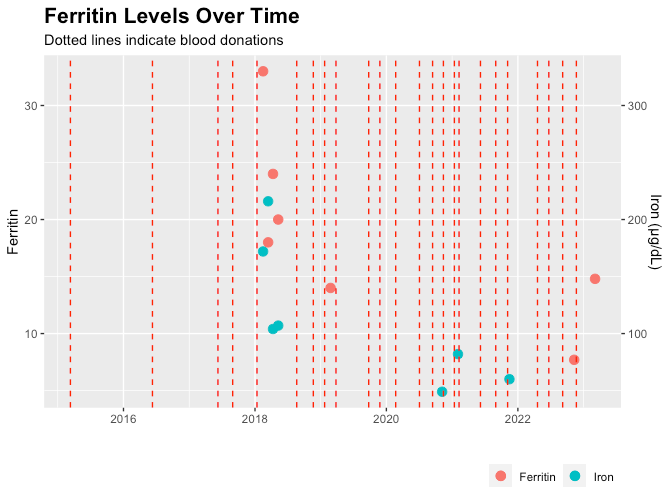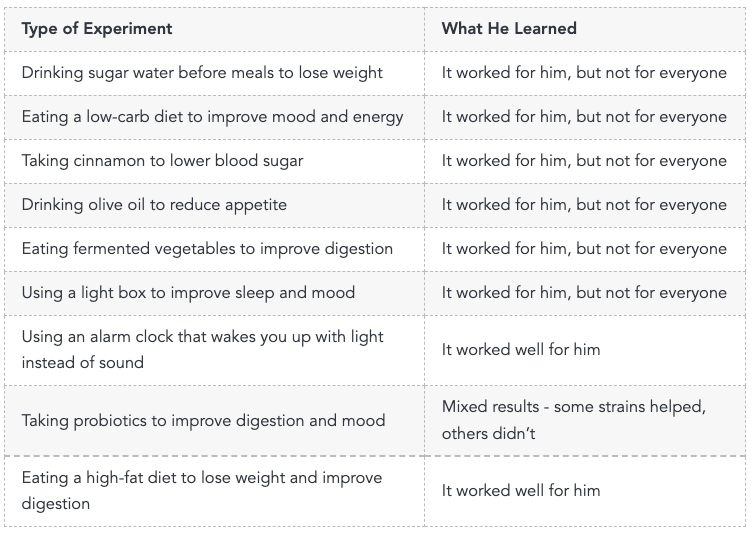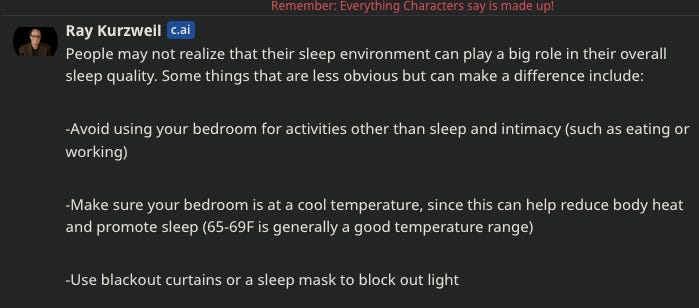Personal Science Week 230427 Blood Donation
Blood donation's effect on iron levels, new GPT, and more.
You’re too busy to read yet another newsletter, so we try to keep these emails short and practical. If you’re looking for something in particular, remember that you can search our entire archive at personalscience.com/archive
This week we’ll delve into blood donation and some more GPT followup.
Back in Personal Science - 9 Jun 2022, we discussed the merits of regular blood donation as a simple way to simulate the conditions of your ancestors, for whom regular injuries formed an important background for how our bodies evolved. That made sense to me and then I read a years-long study of 300 firefighters in Australia that found that those who donate regularly have fewer blood toxins. Giving blood is easy and rewarding (free cookies!), so why not?
Because maybe donating too often can cause blood iron levels to fall.
After my regular SiPhox blood testing made me aware of my unusually low ferritin levels – under 15 ng/mL (“normal” is above 30 ng/ML), a friend (thanks, KT!) who saw Personal Science Week - 230316 AI Chat suggested I take supplements. Then I read a German research paper from 2000 that suggested low ferritin levels are common among regular blood donors. Could this be my problem?
Ferritin and iron are different metrics, and not usually included on standard blood panels, so I’ve only tested them sporadically. Iron, of course is a metal; ferritin is a protein that binds to iron and stores it in the body. When the body needs iron, it releases the iron from ferritin and uses it to make red blood cells.
Bloodworks Northwest keeps an online table of all my donations, so I created this simple chart to show the effects on my iron and ferritin levels.

Although I don’t have the symptoms of iron deficiency anemia — tiredness, weakness, dizziness, headaches — I have noticed a significant increase in breathlessness after even simple exercise. I have as much stamina as anyone — long climbs, ride my bike up and down hills — but I’m out of breath. And I certainly have done a lot of blood donations since the drop in ferritin began.
I’ve worked with the excellent naturopath, Dr. Adam Rinde, for many years and after discussing with him, I’ll begin taking his protocol involving 33 mg of heme iron daily.
Of course I’ll do regular testing, and this week I submitted another SiPhox test as a baseline. Let’s see how this goes!
ChatGPT meets Personal Science
Meanwhile, GPT technology continues to amaze everyone using it for Personal Science. We mentioned Brian Naughton’s Boolean Biotech in Personal Science Week - 20 Oct 2022, and his excellent summary of Computational Tools about what to expect when the latest AI meets biology. Brian also provides code for how to study a PDF with GPT, but now there’s a (free) tool that lets anyone do the same thing.
ChatPDF lets you upload any PDF and ask it questions. We tried it on the Personal Science Guide to the Microbiome with disappointing results. It generated this chart, which if you know me at all, you’ll realize is entirely made up.
Another example of GPT technology: chat with any famous person, like techno-optimist and Singularity prophet Ray Kurzweil at character.ai. Here’s what “he” replies when I asked for some sleep tips that most people haven’t heard of:
You can “chat” with many other famous people (Elon Musk, Alan Turing, Einstein, Jordan Peterson, and many more), or to bots pre-trained as experts at programming, fitness, music, and dozens more. See Character.ai for much more.
More Free Studies
Viome Life Sciences, an affiliate of microbiome test company Viome, conducts regular clinical studies on various new technologies related to personal health. Sign up online for new studies about personalized nutrition to reduce obesity, a longitudinal study of the vaginal microbiome, and several related to gastrointestinal problems. Depending on the study, you’ll get a free Viome test kit, personalized supplements, and various study-related diagnostics like a blood draw. Most of the studies also pay $20 to $200 in Amazon gift cards for successful completion.
See Personal Science Week - 09 Feb 2023 for a list of other free studies you can join.
About Personal Science
Trust the experts, we’re told. But which experts? “You can find a credentialed PhD on the other side of literally any scientific issue”, says the intellectual writer and podcaster Sam Harris. As Personal Scientists, we make up our own minds, asking questions about everything, but placing extra trust in what we are able to prove for ourselves, using our own self-collected data.
Are you doing any experiments? Have any feedback about my blood tests or anything else you’ve found on this site. Let us know.




